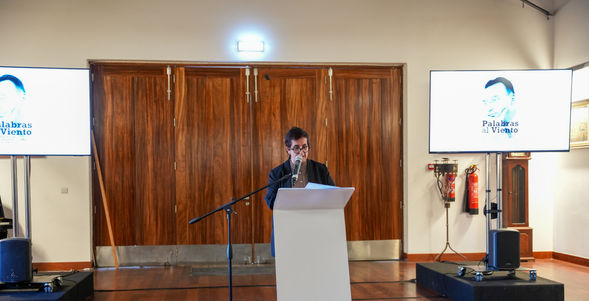Carlo Greppi
Carlo Greppi (born 1982) is an Italian historian, writer, and educator
specializing in 20th-century history, particularly the Resistance and the
Holocaust. He holds a PhD in Historical Studies from the University of Turin
and has collaborated with Rai Storia and Radio 3. Greppi is a founding
member of the Deina Association, which organizes educational journeys to
sites of historical memory, such as Auschwitz, involving over tens of
thousands of students from across Italy.
His debut work, 'L’ultimo treno. Racconti del viaggio verso il lager' (2012),
won the Ettore Gallo Prize for emerging historians. Greppi has authored
several notable works, including 'Uomini in grigio' (2016), 'L’età dei muri'
(2019), and 'Il buon tedesco' (2021), which received the FiuggiStoria Prize
and the Giacomo Matteotti Prize. He also curates the "Fact Checking: la
Storia alla prova dei fatti" series for Laterza, aiming to debunk historical
misinformation.
In addition to his scholarly work, Greppi writes for younger audiences. His
novels 'Non restare indietro' (2016), 'Bruciare la frontiera' (2018) and 'I Pirati
delle Montagne' (2023) address themes of memory and identity, with the
former earning the Adei-Wizo Prize. One of his most recent publications,
'Un uomo di poche parole' (2023), or 'A Man of Few Words' (2025), explores
the life of Lorenzo Perrone, the man who helped Primo Levi survive
Auschwitz. The book has been translated into six languages and ten
countries and won the TIR – The Italian Review Prize and the Città di Ceglie
Messapica Prize.
Greppi's work is characterized by a commitment to making history
accessible and relevant, emphasizing the role of individual choices in
shaping historical narratives.
His last essays are 'storie che non fanno la Storia' (2024) and 'Figlia mia.
Vita di Franca Jarach, desaparecida' (2025), currently being translated into
Spanish.
ABOUT THE BOOK
'A Man of Few Words'
'Much to admire ... an intriguing study of Lorenzo Perrone, the bricklayer who helped the famous author survive Auschwitz.' --The Observer
Daunt’s Book of the Week
Nobody knows how much I owe that man’, Primo Levi said of his Italian compatriot Lorenzo Perrone, who saved his life at Auschwitz. ‘I could never repay him’. Each day for a period of six months, Perrone, who worked beside Auschwitz in desperate conditions, risked his own life to smuggle part of his own soup ration to Levi, quietly leaving the mess tin by a half-constructed brick wall. Without those extra five hundred calories, Levi could not have survived, and would probably not have written If This Is a Man, the first published account by a Holocaust survivor.
In A Man of Few Words, Carlo Greppi pieces together the life of Lorenzo Perrone, a bricklayer from the Piedmontese town of Fossano, not far from Levi’s native Turin. Near-destitute and with minimal formal education, Perrone left very few traces of himself. Yet despite their stark differences – Levi was a middle-class chemist – their friendship survived the Holocaust and continued until Perrone’s tragic death. Levi never forgot Perrone. In every book he wrote, he mentions that he owes his life to a man named Lorenzo, and he returned persistently, in the last years of his life, to the man of few words who saved his life.
Compassionate, worldly and prescient, Greppi brings us a story that has much to say about the world we live in today, about an individual who kept hope alive in one of the darkest times and places known to humankind.
Event Details
Friday, 14 November 2025 at 11:00:00 UTC
The Gibraltar Garrison Library

Governor's Parade, Gibraltar GX11 1AA, Gibraltar



















